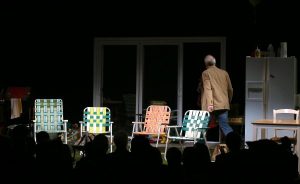
Actor Tracy Letts exits on opening night of the premiere production of The Realistic Joneses. Why am I using this photo to illustrate my review of the Vancouver production? Read the Bonus Tracks and find out. (Photo by Walter McBride)
In The Realistic Joneses, playwright Will Eno behaves like a compassionate—and funny—palliative care nurse.
In the play, Pony and John Jones have just moved in next door to Jennifer and Bob Jones. Now they all live in the same small town. Bob has a degenerative neurological disorder in which a copper build-up affects the brain, especially the language centre.
Grounded in the inevitability of death, the play smells of body horror. “It’s a very personal thing, going blind,” John observes at one point. And, with existential dread, comes the untethering of meaning. Language, which is always frustratingly approximate, becomes even moreso.
The foibles of speech create discomfort. “Do you want to talk?” Jennifer asks her ailing husband near the top of the show. “What are we doing right now? Math?”, Bob replies. Embracing the absurdity of language Eno also creates lines that are knee-slappers. John gets two of the best: “I don’t know if a haiku is the best way to end a conversation,” and “I’d like to say something in Latin right now. Know what I mean, big guy?”
In the sweet melancholy of what appears to be a New England summer—How long will it last? How can one savor it enough?—a series of sketch-like scenes unfolds on and around the lawn chairs in Jennifer and Bob’s backyard and in the light of a refurbished lamp in Pony and John’s kitchen. Characters lie to one another, and betray trust, but the tone is of bafflement rather than cruelty. “I feel like I should go to med school or get my hair cut or something,” Pony says.
In the end, there’s only Pony’s description of canoeing with John—and the comfort one can find in the presence of other humans: “It felt right just being together and not drowning.”
Eno is a great absurdist: a kinder Beckett, a less menacing Pinter. On the strength of the script alone, this Equity co-op production is worth seeing—even though the production is uneven.
As Jennifer, Joan Bryans makes a wonderfully realistic Jones: her delivery of the tricky dialogue always feels spontaneous and emotionally authentic. And Peter Wilson brings lovely spin to John’s smart-alecky defensiveness. On the other hand, Charles Siegel, who’s playing Bob, feels like an actor. He indicates Bob’s fear rather than inhabiting it. And, even though we should never lose sympathy for these characters, in Siegel’s hands, Bob becomes unappealingly passive and whiny. Kelly Sheridan is, appropriately, compulsively perky as Pony. Overall, though, I wanted to see a fuller production of this script, an interpretation in which I got a clearer sense of the undertow, including the fear that drives Pony’s pertness.
In The Realistic Joneses, characters hurl words at one another, hoping to be understood. Language fails them and they fail one another. But all of that matters less than what they are trying to say and who they are trying to be. I find that reassuring.
THE REALISTIC JONESES By Will Eno. Directorial consultant: Renee Iaci. A Mint Collective production at the Vancity Culture Lab on Friday, December 8. Continues until December 17.
Get your tickets here.
BONUS TRACK: I want to share some additional thoughts that I couldn’t fit into the review. If you’re curious, read on.
In The Guardian, Mark Lawson interviewed Will Eno about his play, Title and Deed, which is a monologue. Lawson asked Eno why he is drawn to that form.
Here’s Eno’s answer: “In some ways, I’m probably drawn to the monologue,” he says, “because I was a pretty quiet kid, as there wasn’t a lot of emphasis on talking in the house I grew up in, and so a lot of the conversations I had were in my head or to rocks and dogs. That said, I’ve always found it to be a form that, potentially, has a great amount of theatrical energy in it. The total effect and meaning of a play probably always has to include the audience’s private responses and conjurings, and if the thoughts and feelings of the play can ping back and forth between audience and performer, a large and meaningful amount of area can be covered. The monologue strikes me as an elegant and economical way to accomplish that pinging.”
It seems to me that the notion of pinging, of spacious exchange, applies to The Realistic Joneses as well. Within the inadequacies of language (and behaviour), the Joneses attempt to make themselves known to one another, but they also clearly rely on one another to interpret their intentions. And, of course, sitting in the audience, we are busily interpreting as well.
ADDITIONAL BONUS TRACK: In this interview in HowlRound, Martha Steketee talks to Eno about a number of things, including how audiences respond to his plays.
Eno also talks about tone. In doing so, he describes a photograph from the premiere production of The Realistic Joneses, a production in which his friend playwright Tracy Letts played John. I’ve chosen to accompany this review with that photo.
Eno says: “Its just the four lawn chairs and Tracy Letts in the background, exiting. I always thought it an incredibly moving picture. He’s sort of leaning to the side and he looks so Tracy Letts-ish somehow. The chairs look a little sad but also bright—just sort of sad and not eerie, but melancholy maybe. Tracy looks kind of happy. When people say there’s a spring in someone’s step, it looks like a photograph of the spring in someone’s step.”
NEVER MISS A REVIEW: To get the best of my theatre writing, including my reviews, once a week, sign up for my newsletter. It’s free! And there will be contests and prizes—including theatre tickets.





0 Comments